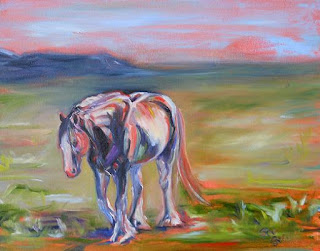Out of Body vs In Your Body Experience and Horses
Equine Art by Sue Steiner, original oil painting
People often talk about 'out of body' experiences. We've probably all experienced those times when some stressful event happens and have a surreal feeling of not being completely there. It can happen in a fun way when you are so happy you have to pinch yourself to see if its a dream or those awful moments when something terrible has happened and you go into deep shock and denial. We will take those extreme ends of the spectrum out of this conversation and just talk about everyday ways in which we can get kind of 'out of body'.
I find I can get this way when I am distracted, busy or over committed. I lose touch with when I've eaten or I stay up late in spite of needing sleep. I keep working in spite of not feeling well. I do my heavy barn chores in spite of sore muscles. I tune out what my body is telling me. This goes along with the theory of how we need to just buck up and deal with it! Its not always a bad thing.... but to be out of tune with your body for long stretches can cause health problems. To be out of your body as in being 'ungrounded' means you lose out on much of what is going on around you in the moment.
An area I am exploring with my own horses is seeing the reaction in them when I ground myself vs. when I am not grounded. Being grounded is being in your body. Being centered is being in your body in a specific way. Sally Swift's classic riding book 'Centered Riding' makes this concept familiar to many horse people.
If you are curious as to how grounded of a person you are I found this online test.
How Grounded Are you?
In my everyday life I failed this test miserably! :) I think it is NOT very ADD friendly! As an artist who may have just a teeny bit of ADD tendencies it is not easy for me to stay grounded in my every day life. Creating art can be a wonderful 'out of body experience' which I value greatly! But having my head in the clouds at other times is not so great. This is what the quiz told me. ~~ Your score is 80%. Being grounded is foreign to you. Do yourself a favor and try some grounding exercises to reintroduce yourself to your body.~~ Oh great!
The good news is that horses are very grounding! I have discovered as I recognize my ungroundedness away from horses I see naturally become grounded WITH them! It's also not particularly safe to ride most horses NOT grounded. Its hard NOT to be connected to your body when you ride. The ultimate ride comes when you are connected to your body and your horses body. I enjoy riding bareback for this reason. I have a great bareback horse that prefers being ridden that way. I ride her with a bareback pad and a rope halter and really enjoy being able to feel her muscles. She is also so tuned into me that it has taught me to balance and stay relaxed. A common tendency for people who first ride bareback is to want to clamp down with their knees and legs and hold on that way. In fact keeping your muscles soft and relaxed with your legs not tensed allows for better balance and a more relaxed horse! My mare is very sensitive to leg pressure - she responds to the slightest tensing of my calf muscles so for her to have me clamp down would feel like I am screaming at her. I think most horses are capable of being this sensitive but some have learned how to tune us out and become dull as a result. Or anxious. Kind of like people do! We all can relate to people who cope by either being so insensitive or to being the other end of the spectrum and SO sensitive they are hard to work with. Somewhere in the middle is the goal! Balance in life, balance on the horse!
I am beginning my exploration of somatics, horses and healing.
somatic /so·mat·ic/ (so-mat´ik). 1. pertaining to or characteristic of the soma or body.
Horses provide a wonderful way in which we can see immediate results with how 'in our body' we are. As a person experiences how this feels with a horse they can learn how to use that in their everyday life. The bridge between the horse experience and everyday life experience is where EAL or equine assisted learning comes in. People are put into situations in equine sessions to experience this kind of thing and then it is learned and hopefully applied in their life. It can become like a muscle memory not unlike an athlete learns for their sport. You first have to learn how to locate the muscle, experience the feeling and then practice it until it becomes second nature. The muscle, using this term loosely, in EAL is the body sensation of feeling grounded. Some can understand the process in theory but not know how to identify the feeling. When it is experienced in a session with the horses giving feedback it can be learned and practiced.
I should clarify also that EAL is typically not a riding experience so my example above of bareback riding is just a personal experience I enjoy that really allowed me to feel the in tune with my horse. There are many ways to experience this on the ground which does not require horse experience provided you are part of an EAL or EAP session. I don't recommend people trying this without someone experienced in equine assisted learning or equine assisted psychotherapy.


Comments
Post a Comment
I value your thoughts on this subject.